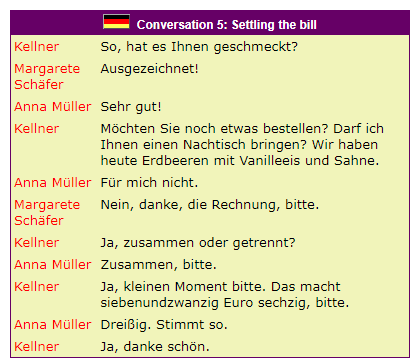
so---This approximates to "well then". It never means the English "so" as in "a logical conclusion".
Hat es Ihnen geschmeckt?---"Did you enjoy your meal?". The literal meaning is: "Did it taste to you?"
ausgezeichnet---"Excellent!" But then Margarete has had two beers by now...
sehr gut---very good
noch etwas---"Something else". This always has the sense of an additional something rather than "something different".
der Nachtisch---"dessert". It literally means "after-table".
darf ich...? "may I...?" Just like "Ich möchte...", it is always followed by the infinitive of the verb which it governs.
darf ich Ihnen einen Nachtisch bringen?---"May I bring you a dessert?". And it is "einen Nachtisch", because the masculine noun "der Nachtisch" is the object of the sentence.
heute---today
die Erdbeere---"strawberry". As we have seen, many feminine nouns end in "-e", and form a plural in "-en".
das Vanilleeis---"vanilla ice-cream". This is another German compound noun, coming from "die Vanille" (= "vanilla") and "das Eis" (= "ice cream"). As "das Eis" is the final element of the compound noun, it determines the gender.
die Sahne---cream
für mich nicht---"Not for me". Note that the German word for "not" - "nicht" - follows the noun to which it refers.
die Rechnung, bitte (Could we have) the bill, please?
zusammen...---together...
...oder getrennt?---"...or separately?" The waiter is thus asking them whether they wish to pay together or separately.
kleinen Moment, bitte---"One moment, please". Literally: "A little moment please".
das macht... "It comes to....". Literally: "This makes...".
siebenundzwanzig Euro sechzig---Twenty-seven euros sixty
dreißig---Thirty
 英语
英语 日语
日语 韩语
韩语 法语
法语 西班牙语
西班牙语 意大利语
意大利语 阿拉伯语
阿拉伯语 葡萄牙语
葡萄牙语 越南语
越南语 俄语
俄语 芬兰语
芬兰语 泰语
泰语 丹麦语
丹麦语 对外汉语
对外汉语

